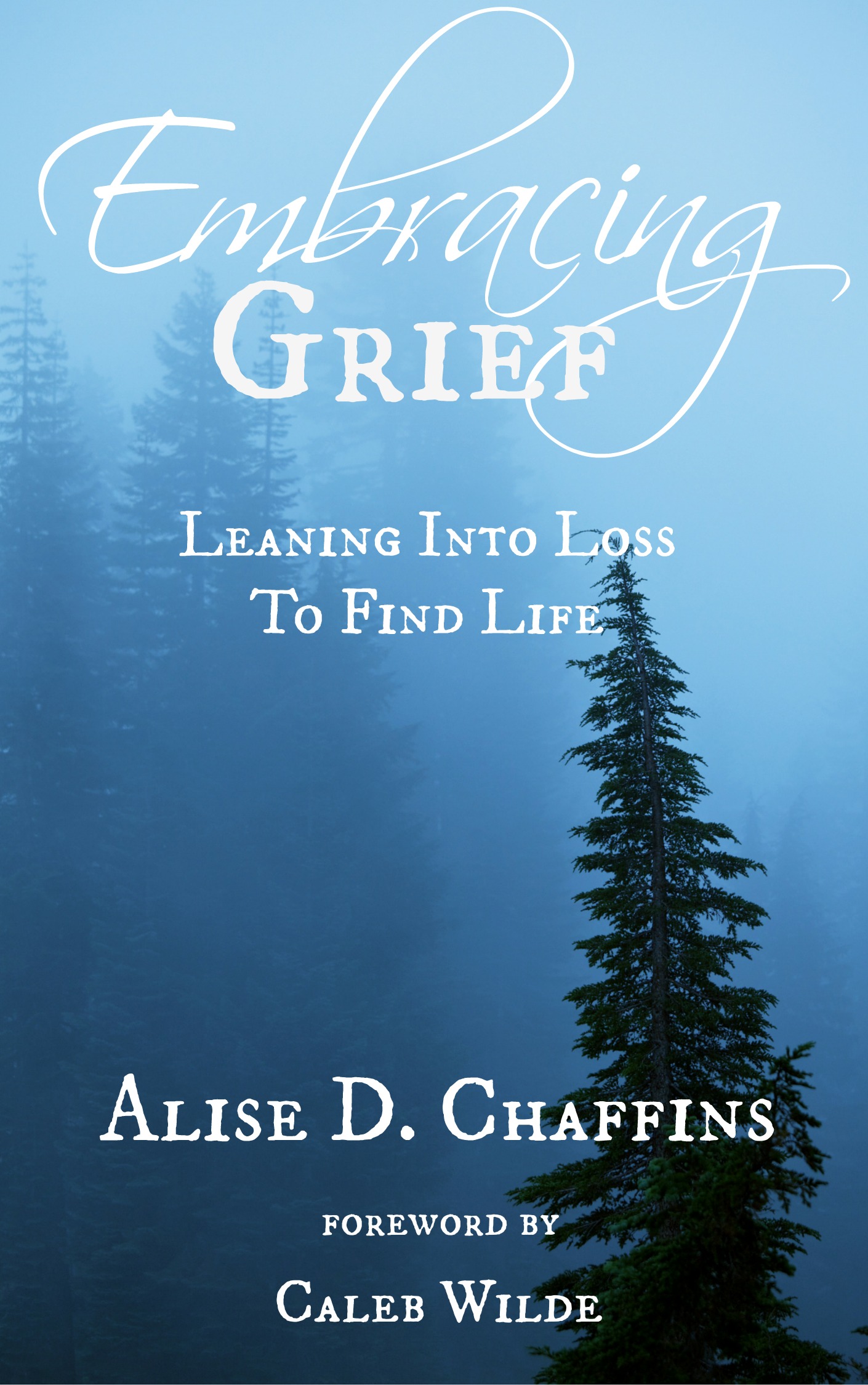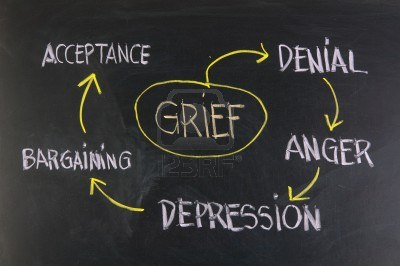Grief
Healed By Grief
The following guest post is written by Alise Chaffins:
A popular television show that ran during my formative years was Roseanne. It detailed the everyday life of a blue collar family trying to make it in the world. I watched the show, but it never fully resonated with me because I had a hard time believing that one family could encounter one bad experience after another. Surely at some point they would catch a break? It just felt a little unrealistic to me, watching with all of the wisdom of a high school student. No one has that many bad things happen to them.
For a long time, that was true. My life moved along with the kinds of ups and downs that you expect from life. Not free from pain, but certainly not categorized by pain.
Then from 2013-2014, everything in my life fell apart. My mom was diagnosed with ALS and passed away just 11 months later. I had an affair which ended my 16 year marriage. I got pregnant before my divorce was even final, and then suffered a stillbirth at almost 36 weeks of pregnancy. My oldest child came out as transgender and because we supported him, we were asked to leave our church.
Every time I felt like things were beginning to turn around, every time I felt like I was getting a handle on my life, something else would cause me to lose my grip. By August of 2014, I felt like I was drowning in grief.
I tried to ignore it. I tried to fight it, but as I did, the more that I discovered that I was consumed by it. There was no escaping grief, it went with me no matter where I was. Fighting might leave me with a temporary reprieve, but more often than not, it simply left me more exhausted than I already was.
Rather than ignoring or fighting, I began to realize that I had to be willing to experience my grief more fully in order to move through it. I had to find the places where hurt threatened to choke me and dig into them. Instead of looking to be healed from grief, I began to look for ways to be healed by grief.
As I opened up about my grief, I found that there were others who would join me in that sacred space. Not looking to fix me, just those who wanted to sit with me, to comfort me in my sadness. People who would listen to what I was saying, and to what I didn’t say. People who offered practical help when I asked, and even when I couldn’t ask.
I found that when I pulled my grief in close, it had less power over me. I felt less guilt about mourning various losses because I recognized that grief was not my enemy. I experienced less shame as I realized that I had a right to grieve losses, even if they were gains for others. By becoming more open about bereavement and leaning into grief, I was able to find hope, both from outside sources and from within me.
We will all experience loss at some point in our lives. We can try to run from it. We can try to fight it. We can try to numb it. We can try to heal from it.
Or we can embrace it. And we can be healed by it.
****
Her book Embracing Grief: Leaning Into Loss to Find Life is now available.
Drowning in the Waves of Grief

© 2011 Aimanness Photography, Flickr | CC-BY | via Wylio
Waves crash over you, throwing body and mind
In chaotic directions of darkness and pain.
You were made for the land and so you hold your breath
As you claw your feet into the ground.
The currents pull you out deeper and deeper
Each gasp is met by another wave of details and emotions.
What do we do now?
“Gasp”
When should we have the funeral?
“Gasp”
Should I go back to work this week?
“Gasp”
How can I raise the kids on my own?
“Gasp”
Death and grief plunge you again into a foreign terrain
Where every breath is struggle.
You weren’t meant for this
Separation
Grief
Death.
You will never see them again
Except in the recesses of your mind where
Memories will be replaying
Scenes that become distorted by time and erosion.
The sleepless nights
“Gasp”
The disingenuous platitudes
“Gasp”
The religious cliches
“Gasp”
The loneliness
“Gasp”
Wave after wave.
You will not accept this.
You will never reach “acceptance”
Of the new normal that threatens the foundations of being
Foundations broken by the waves that rippled
When he/she fell into the depths of the oceans
Leaving you in the wake of the waves.
Pitfalls of Kubler-Ross
Today’s guest post is written by Chad Harris:
Ask most people what they know about grief, and they will likely mention that it’s made up of 5 stages:
- Denial
- Anger
- Bargaining
- Depression
- Acceptance
Makes it all sound neat, tidy, and orderly, doesn’t it?
Problem is, grief is messy!
Kubler-Ross did not originally intend for her model to be widely accepted as a model of grief and loss – in fact, her stage theory came out of her work with those who were actively dying, not those who were grieving the death of a loved one. Yet, the medical establishment and the general public embraced this model, in no small part because it seemed intuitive and orderly. However, classifying them as stages diminishes the fact that people may not move through these thoughts, feelings, or actions in order. In fact, they may skip ahead, work through them out of order, go backwards between stages, or even repeat stages. Perhaps most troubling, such a model makes those around the griever more likely to think they know what the person is going through – and that they can helpfully tell the person what to expect next.
Did I mention that this is rarely the case since grief is messy?
In the years since Kubler-Ross’s work started gaining ground in the late 1960s, a number of alternate theories have been proposed, and while there is no one grand unified theory of grief – and no one theory can explain everyone’s grief (since it’s messy!), one that has gained much traction and that helps provide meaning to the rituals of mourning through which we express our grief is found in the work of psychologist Dr. J. William Worden.
In his 1982 book “Grief Counseling and Grief Therapy”, Worden proposed that when we are faced with grief, we make sense of that grief (as much as is possible) and find our way back to some semblance of daily functioning through the act of mourning – our public “face” of grieving a death.
Worden proposed that each grieving person undertakes four tasks in order to process the death of someone meaningful, and by doing so, a griever comes closer to finding their way to their new normal.
Worden’s Four Tasks of Mourning
- Accept the reality of the loss.
- Work through the pain of grief.
- Adjust to an environment in which the deceased is missing.
- Find a way to form an enduring connection with the deceased while embarking on a new life.
Accepting the reality of the loss is vital. In order to heal, we must first understand that we’re hurting and that something is not the same. Sadly, growth and change is often spurred by discomfort. While there are a number of ways to begin to either accept the reality ourselves or to help others, among the most effective are funerals/memorial services and using words that aren’t cloaked in platitudes or euphemisms. The loved one in question didn’t get lost, nor did he or she expire like a carton of milk. He or she died. People die. It’s part of the human life cycle, and it’s important to embrace this fact.
Working through the pain enables us to not feel stuck and to begin to find some level of healing. It keeps us active, engaged, and moving ahead, helping to keep us from feeling stuck. Will we feel stuck sometimes? Of course! As long as we remain open and honest, though, we will make our way forward in our own time and in a way that makes sense to us.
Adjusting to an environment in which the deceased is missing does not mean forgetting the person existed. It merely means understanding that our worldview has been irrevocably changed, and though the person is no longer physically present, our memories will keep them with us.
Finding a way to create an enduring connection means honoring the person through our actions and carrying them with us in our hearts. Pictures, favorite books, or even volunteer activities that you do in their memory can help create this lasting, meaningful connection. As long as we hold the person close to us and honor that connection, they are not lost to us, even if they may not be physically present.
Worden’s tasks allow grievers to move ahead at their own pace. Yes, they are placed in some semblance of order, but they are tasks, and not merely things that happen to us or thoughts, feelings, or emotions we are carried through in a passive manner – which is how a reliance on the Kubler-Ross model can often make people feel. Worden’s tasks are active. Worden’s tasks empower grievers, giving a greater sense of control than models like Kubler-Ross’s.
Worden’s model isn’t perfect, of course. It appears quite linear and it may also seem as though there is no room for sliding backwards amid the tasks. After all, grief is messy, and a griever may often feel waylaid by what Dr. Therese Rando calls “sudden, temporary upsurges of grief”, or STUGs. No matter how long it has been since our loved one has died, we are going to have moments when we are a complete mess and miss the person even more than we thought we could – and we may feel like all of our progress to this point has been for naught.
It’s important to remember, though, that on any journey, no matter the model we subscribe to, we stumble – and that’s especially likely on a journey like the one through grief that is never-ending. Whether we’re grieving or supporting someone who is, it is important to remember that we will stumble and struggle. These are not failures…they’re simply realities that happen. We may have moments of sadness, even though we feel as though we’ve moved far beyond that point – or we may have moments of joy when we feel as though it’s not appropriate. Never judge nor apologize for what you or someone else is feeling. That’s our subjective reality in the moment, and everyone is entitled to those feelings.
*****
About the author: Chad Harris is a graduate student at Hood College in Maryland, where he is pursuing a master’s degree in thanatology, as well as coursework in gerontology. He also holds a bachelor’s degree in journalism from the University of Central Arkansas, as well as a master’s degree in social work from Case Western Reserve University. He is currently researching the role of mass media in shaping people’s perceptions of death and the impact of media coverage on grief and mourning, with the hopes of helping promote more responsible coverage of tragic events.
SURVIVING GRIEF AND THE HOLIDAYS
Today’s guest post is written by Pastor Dieter Reda:

© 2010 seyed mostafa zamani, Flickr | CC-BY | via Wylio
It was one day before Christmas Eve. The casket stood at the front of the decorated church, almost literally under the Christmas tree. In less than 24 hours the place would be packed to capacity and ringing with joyful carols and other festive music. But today it was the scene of the funeral of a prominent church member. In the casket was a 51 year old father of three: two teenagers and a twelve-year old. For them and their widowed mother this scene was surreal. The husband and father had died of cancer. The family had hoped he would at least make it to Christmas. A few days earlier, when I met with them in the home, the widow bitterly remarked, “some Christmas this is going to be.”
What does a young preacher in his twenties say in such a situation? Seminary had not prepared me for this (or a lot of other things still to unfold in my ministry). Fortunately – or not—there had been some preparations. I had been handed a piece of paper, on which were written, in the handwriting of the deceased, Scripture Readings, hymns, and a terse note: “I want you to preach on the following text which I have chosen.” That paper was indeed the framework for the service and it allowed us not to have to comment on the obvious by referring to Christmas.
That was more than 30 years ago. And while I never again had something quite that dramatic, I did have to again and again comfort people who were facing the first Christmas without a loved one, or the last Christmas with a terminally ill family member. And hence, these little pointers.
The first thing I would say is that there is no right or wrong way to handle grief at Christmas, or at any other time for that matter. What is helpful to some, will be useless for someone else. How you choose to handle the holidays will depend on your religious beliefs, your cultural customs, how you are emotionally “wired” and many other factors. What follows is intended only as some pointers to liberate you from the fear of the holidays.
- Don’t let anyone tell you what you should or should not do. It is possible that you will receive unsolicited advice from people who have good intentions, but are lacking in courtesy and tact. Listen if you must, but DO what you think is best and helpful to you.
- Should you “Skip” Christmas? It may surprise some to hear me as a minister say, “by all means—if that is your way of coping.” No one is under any obligation to “keep Christmas”. I reminded my congregation that the early Christian church got along quite fine without celebrating Jesus’s birth, and nobody knows the date on which he was born, except that it more probably than not wasn’t on December 25. If Christmas is just too much to handle emotionally one year, go easy on yourself and dispense with all of it…sending cards, buying gifts, going to parties, or even going to church. The family that I wrote about above did not attend the Christmas Eve service the day after the funeral, and nobody faulted them.
- If skipping Christmas is not for you, then consider a “different” Christmas. While some people take comfort in keeping old traditions alive, others find it more helpful to invent new traditions. Moving the venue of the celebrations can give a fresh perspective on things. I remember the first Christmas after my mother died, we moved the family celebration from my parents’ home to my home. For me the added work was a wonderful distraction and it acknowledged that Christmases would permanently be different.
- Try not to mask your grief. Some people do that by throwing themselves into as much activity and as much merriment as possible. Others avoid mentioning the name of their loved one thinking that will bring “bad luck” or make things worse. But the contrary might be true. Christmas is a nostalgic time and some have shared with me how helpful it was to remember the good Christmases past, even if that brings on tears. You might find yourself crying one minute and laughing the next, even as you remember some of the fun times with your loved one.
- Go Easy on yourself. Particularly if you are the caring and nurturing type who likes to take care of everyone else.
- Accept Gestures of Help and Support. This is a double edged sword. People who are bereaved often feel neglected and left out after the funeral. On the other hand, people have told me how they tried to reach out to bereaved friends only to be repeatedly rebuffed. Finally they gave up. If someone offers to do something for you like provide a meal, a gift, or help with a chore do accept it graciously…or ask for a rain check if the time just isn’t right.
And How Can You Be Helpful to Someone Who is Grieving Over the Holidays?
- Don’t Assume that because someone is in mourning, they want to be Excluded from Social Invitations. Let them make that decision. Perhaps being included, especially in things they used to do with a group of friends, is just what they need. Do invite them, but give them the freedom to decline if that is better for them.
- Don’t Pretend that the Deceased Never Existed. Friends are sometimes afraid to mention the name of someone who died, fearing it will upset the family. The truth is, they are thinking about their loved one a lot, and some have told me how hurtful it is when others behave as if the person was forgotten. Mention the deceased by name, when it would naturally come up in conversation, such as talking about memories – Christmas or otherwise.
- Should I send a Christmas card? There is no right or wrong answer to that. It would depend on what your usual custom is, how close to Christmas the death or funeral is etc. If you always exchanged cards, it might seem unusual to your friend if you suddenly stopped. In addition to the pre-printed prose that comes in the card, a hand-written note that you are thinking of them in a special way will probably by meaningful. As in other expressions of sympathy, avoid clichés, and unhelpful platitudes.
- Avoid saying, “If there is anything I can do, please call”. Most people will not take you up on it, thinking they are imposing or otherwise inconveniencing you. Also many people who say that, do it to ease their own conscience (at least we offered!) even if they have no intention of doing anything. It is much more thoughtful to find a need and meet it. Don’t ask if you can bring over a meal or shovel their snow or whatever. Just show up and do it. Or keep in touch with phone calls, emails, or visits, depending on your relationship. Perhaps you will become aware of something that “you can do”.
- Be Persistent but not overbearing. Be there when you are needed, but give your friends space when they need that. Be a ready and willing listener, but don’t ask prying questions.
- Invitations to small gatherings or perhaps a lunch with just the two of you might be more helpful than a large party (although consider # 1 above)
- Don’t Pretend that Everything is fine like it used to be. This Christmas will be different for your friends, and perhaps it will be difficult. The mirth and the joyful celebration of others may underscore the pain your friend is feeling. Don’t pretend by telling them to “get their mind off things” or say “you’ll feel better if you ….” Help your friend to make the best out of a difficult situation. They will remember your thoughtfulness…or your insensitivity for years to come.
Dieter Reda has been an ordained Minister for the past 34 years and served various churches in central and western Canada. Since 2003 he is senior pastor at Mission Baptist Church in Hamilton, Ontario (Canada). His blog of pastoral musings on various issues is at www.dieterreda.com and you can follow him on Twitter @Dieterreda.
21 Self-Portraits of Living after Loss
This series, entitled “Still, Life” is the work of Sarah Treanor. All the photos have been used with Sarah’s expressed permission.
Sarah writes, “Shortly after the death of my fiancé in 2012, I began taking self portraits.”
“I didn’t know why at first, all I knew is that some part of me needed to see myself.”
“I felt like I had died too… the images gave me proof that I was still living. A way to externally explore and express everything that was going on inside of me.”
“Still, Life is a project that was birthed out of those initial snapshots – one photo each week for the year of 2014 – exploring the complex emotions around the death of my partner and how to keep living on.”
“I have been using art to cope with life’s challenges nearly all my life.”
“At age nine, I lost my mother to breast cancer. Making art became my sanctuary, my escape from the pain.”
In my adult life I’ve come to use creativity to cope with things I never imagined I would have to at such a young age. In my mid-twenties, I lost my father to heart and lung disease. Parentless at 26, I took up photography as an escape.
“I found that when I was behind the camera I went to a whole other place…”
“… able to focus on the present moment and on finding the beauty right in front of me.
“It was meditative and created a sanctuary again for me – just like other art forms did for me as a child.”
“Then, in the summer of 2012, my fiancé was killed very suddenly in a helicopter crash while working as a contract pilot.”
“I was three months shy of my 30th birthday and my whole future vanished with one phone call.”
“His death changed everything about my life.”
Everything.
“His death made me realize I had walked away from my dreams… wandered off the path.”
“I left my career behind as a designer, left the city we called home, and I began again out in the country, writing and making art.”
“Creating things has always been the only way I’ve been able to breathe in the midst of great loss.”
“The only resting place, and the best vantage point from which to see myself and my own journey – both the pain and the joy.”
“Photography helps me find my peace, and also helps me to express parts of my story and emotions in ways that cannot be said with words.”
“My goal in sharing my work is to help others who are going through their own darkness to feel less alone.”
Follow Sarah on her blog or Facebook to see each week’s self-portrait and for prints of her photographs visit her Etsy shop.
























